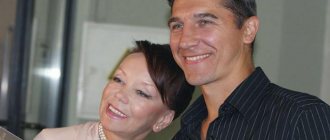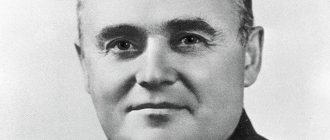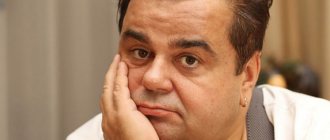Biography
Sergei Zhilin is known as a talented conductor and composer, a witty conversationalist and a virtuoso pianist. The musician performed at Vladimir Putin’s birthday party, and former US President Bill Clinton considers him the best jazz performer. His “Phonograph-Symphojazz” is a unique symbol of television vocal competitions and concerts of pop stars who prefer relaxed communication with the audience.
From the biography of Zhilin
The artist’s personal life is jazz. He is the best jazz pianist according to former US President Bill Clinton. Agree, not every Russian artist can boast of such a high-profile title.
Zhilin’s date of birth is October 23, 1966. The musician was born in Moscow. It was no coincidence that music took first place in his life. In Zhilin’s biography there was one person, thanks to whom the artist became what he is now. This is his beloved grandmother. The woman was a violinist and pianist. Now it’s not difficult to guess why Zhilin chose these two musical directions.
Sergei Zhilin in childhood
The boy first sat down at the piano at the age of 2.5 years. Perhaps, if not for his grandmother’s assertiveness, he would not have started making music. In the granny's dreams, her grandson was supposed to grow up to be a performer of academic music. Little Seryozha’s parents also dreamed about this.
The biography of Sergei Zhilin was already written in the dreams of his loved ones. Of course, they would like his personal life to improve. A wife and children are what every man needs. But, as it turned out later, music took first place for Sergei...
To achieve the desired goal, his parents and grandmother fiercely ensured that the boy diligently studied music for 4 and sometimes 6 hours a day. This is a lot even for a beginning musician, not to mention a child.
As a child, Zhilin had several favorite musical composers, whose work he admired and whom he wanted to be like. These were Rachmaninov, Liszt and Grieg. After some time, Serezha developed a new hobby - jazz. It was a shock for my grandmother. The parents were also a little surprised. Subsequently, Zhilin surprised his loved ones even more.
He began to engage in aircraft modeling, football, and also played in 2 vocal and instrumental ensembles. In general, besides music, Serezha had something to do. Although in the future he preferred it to all other areas of activity.
Childhood and youth
Sergei was born on October 23, 1966 in Moscow. He was not even 3 years old when his grandmother, a piano and violin teacher, decided that her grandson would have, if not a creative biography, then at least good knowledge of music. The child sat at the instrument for four and sometimes six hours a day.
At the same time, Zhilin went to a school for gifted children at the conservatory, where he “became a champion in the number of bad marks in a short period of time.” And all because I was torn between drama school, aircraft modeling, football, bicycle racing and playing in two vocal and instrumental ensembles.
View this post on Instagram
A post shared by Kirov Kassir (@kirov.kassir.ru) on Feb 2, 2019 at 2:09pm PST
Sergei refused to study at the military music school when he realized that he would have to break up with his hobbies. The guy was transferred to a comprehensive school, but he couldn’t stay there either. After the 8th grade, Zhilin entered a vocational school to become an electrician for aircraft equipment, where he did what he loved. Even in the army, he served in a song and dance ensemble, running AWOL to rehearse.
Sergei later received a Master of Arts from the International Academy of Sciences in San Marino. And none of my former classmates took music seriously, not to mention their own orchestra. After 35 years, the director of the Central Music School asked Zhilin to give a master class to the new generation of students. And at the concert dedicated to the institution’s anniversary, he closed the festive program.
In childhood and adolescence, Sergei liked the romantic composers Rachmaninov, Liszt, and Grieg. And suddenly a new hobby appeared - jazz, which upset my grandmother a lot. The “fault” for this was the “Leningrad Dixieland” record, which was listened to to death.
Youth and interests of Sergei Zhilin
Sergei grew up as a versatile guy, so in addition to music, he was attracted to cycling and football. Later, Sergei Zhilin began studying at a military music educational institution. The young man's choice was largely influenced by his parents. As soon as it became known that he had been accepted as a student, the guy changed his mind about enrolling. According to him, it was difficult for him to imagine himself in the role of an orchestra conductor or an ordinary military musician.
Sergei Zhilin with Bill Clinton and Boris Yeltsin
Few people know that his passion for aircraft modeling became a decisive aspect in his life. After refusing to receive a military education, the young man began to actively collect models of various aircraft.
Along with aircraft modeling, Sergei studied at a special music school. However, he was forced to transfer to a regular educational institution due to poor academic performance. He received his secondary education at a local school, from which he graduated with a degree in aircraft electrical installation. This was followed by military service, where the future famous jazz musician participated in a creative musical ensemble.
Sergey Zhilin and Phonograph-jazz
Music
In 1982, the young man came to enroll in a musical improvisation studio, and by the end of the 1st year a piano duet had formed - Sergei Zhilin and Mikhail Stefanyuk. The friends played Scott Joplin's ragtimes and their own adaptations. This is how Phonograph was born.
The group's debut took place in the spring of next year at a jazz festival. A little later, Sergei met composer Yuri Saulsky. He invited Phonograph to the Moscow Jazz Festival. From the very first steps, the musicians won the love of the public.
Then Zhilin was invited to a joint tour by the artistic director and chief conductor of the Presidential Orchestra of the Russian Federation, Pavel Ovsyannikov. The team was entrusted with the support of the anniversary concert by Raymond Pauls. For the first time, the team led by Sergei left Russia together with Valentin Yudashkin.
View this post on Instagram
A post shared by Kremlin Palace (@statekremlinpalace) on Oct 23, 2019 at 6:50am PDT
Now the pianist says that there was no sharp rise in his career.
“If we look at my example, there was systematic work. And the more in demand I become, the more I have to work. There are no takeoffs, you shouldn’t count on them. What you definitely need to count on is your strength and your work.”
By 1995, Sergei Zhilin’s project took shape in the Cultural organization, uniting under its roof the Jazz Trio, Jazz Quintet, Jazz Sextet and Dixie Band.
The core of the Big Band is made up of musicians who played in the Russian version of the musical Chicago. The Jazz Quartet features the voice of Alla Sidorova, whom critics consider the brightest and inimitable in Russian jazz.
View this post on Instagram
A post shared by “Phonograph” by Sergei Zhilin (@fonograf_jazz) on Dec 18, 2020 at 6:18am PST
Sergey Zhilin and Elena Malysheva
“Jazz band” is focused on fashionable electronic sound, drive combined with lightness. “Symphojazz” was created specifically for the presentation of an album with works by Pyotr Tchaikovsky in jazz arrangement. This marked the beginning of the revival of pop music by classical symphony orchestras.
Next came a children's school of pop-jazz art and a recording studio, where popular Russian artists still record to this day. Zhilin himself creates the arrangements and acts as a conductor. The artist’s discography includes dozens of records.
In 2002, the television era began for Phonograph. The team accompanied participants in the competitions “Dancing with the Stars” and “The Voice” (including projects for children and older people), the show “Can You? Sing!” and “PROPERTY OF THE REPUBLIC”. In “Two Stars” Sergei tried himself as a singer, receiving the support of Angelica Varum.
The history of the birth of the musical group "Phonograph"
It is still very early to talk about the personal life of Sergei Sergeevich Zhilin, about his wife and children. Now all his free time will be occupied by “Phonograph”.
The basis of this musical group is the duet of Sergei Zhilin and Mikhail Stefanyuk. They met when Sergei came to enroll in a musical improvisation studio. This was in 1982. Their duet formed around the end of the first year. The musicians played already known musical compositions, and also prepared modern adaptations of classics.
Sergey Zhilin with other members of the musical group “Phonograph”
The musical duo made their debut in 1983. Somewhat later, at one of the festivals, Zhilin met the composite artist Yuri Saulsky. So “Phonograph” was invited to participate in one of the Moscow festivals. As soon as the duo set off on their own, they immediately won the love of the public.
The next year Sergei is already in the army. He spends his days off playing. This year, soloist Alla Sidorova came to Phonograph.
The year 1992 means a lot in Zhilin’s musical career. Then he met Sergei Ovsyannikov. The latter was the leader of the Presidential Orchestra. Agree, such an acquaintance would not hurt anyone. Especially young musicians. Naturally, this could not but have a positive impact on the activities of Phonograph.
Sergey Zhilin in the “Voice” program The musicians were noticed. The conductor began to often invite them to his performances. Playing with the Presidential Orchestra meant even greater popularity and attention from the public.
The musicians achieved all this thanks to a high level of playing, as well as the ability to quickly create a high-quality arrangement. The artists grasped everything literally on the fly.
A year later, Sergei Zhilin became famous throughout the world. At that time no one had discussed his wife or children. The interest in the artist lay in something completely different.
Look at the photo. Here Zhilin is pictured with Bill Clinton. In 1994, they performed together. Clinton decided to play the saxophone. Zhilin got a piano. After playing several musical compositions, Bill Clinton praised the Russian musician, saying that it was a pleasure to play with him.
Joint speech by Sergei Zhilin and Bill Clinton at the residence of Boris Yeltsin in 1994
In 1995, the activities of “Phonograph” as such ceased to exist. It was replaced by a whole creative organization, which also included the previous name of the group. Later a recording studio was created. From that moment to this day, recordings of albums by famous Russian musical performers often take place there.
In 2005, Zhilin became an Honored Artist of the Russian Federation.
Sergei Zhilin at a concert
Among the most recent important musical events in the biography of Sergei Zhilin, it is worth noting his participation in the project “Two Stars” (2006), “DoRe” (2009-2014), “Voice” (since 2012) and “Voice. Children" (since 2014).
Currently, Sergei Zhilin is the leader of several jazz groups.
Personal life
The personal life of Sergei Zhilin is closed from prying eyes. According to unconfirmed rumors, the conductor had two marriages. In the first, a son was born, the second wife worked briefly at Phonograph. It is unknown whether the musician has a companion today. He does not talk about family and relationships.
At home, the master, contrary to expectations, has no instruments. Instead of a piano there are many televisions, which is more convenient for the owner. Sergei leaves the studio, where he spends up to 90% of his time, for the sake of sports. He has a yellow belt in karate and goes to the gym. In addition, he collects ties; there are already over 300 pieces in his collection.
View this post on Instagram
A post shared by BIG BEN restaurant (@bigbensyk) on Dec 4, 2019 at 7:08am PST
Sergey Zhilin in 2020
Zhilin is a tall man of 196 cm, which periodically confuses his close friend Dmitry Nagiyev. The host of the “Voice” show each time asks the pianist to sit down so that the difference in “parameters” is not noticeable.
Phonograph has developed an official website and opened a group on VKontakte. On these resources, fans can find information of interest. There are posters, tour programs, interviews and photos.
Getting your way
The man said, the man did. Sergei signed up for an aircraft modeling club. Zhilin even once became the champion of Moscow in collecting models among schoolchildren. The young man was assigned the third category. This is what he was going for!
Famous musician Sergei Zhilin
Sergei's hobby did not prevent him from going to the theater, participating in vocal and instrumental ensembles and visiting a jazz studio. It’s true that there were problems with the lessons: in such a busy life there was no time left to do homework. From the music school where Zhilin went he had to transfer to an ordinary school.
But Sergei didn’t quite succeed in everything in a general education institution, because it didn’t work out. Then, after finishing the eighth grade, the boy transferred to school. Here he received a specialty as an aircraft electrician.
After vocational school, the army was waiting for Zilina. In the military unit, the guy found himself in a song and dance ensemble.
Sergey Zhilin now
Friends nicknamed Sergei Superzhilin, referring to his ability to work and the ability not only to create, but also to manage. Over the decades during which Phonograph has existed, neither federal nor local authorities have provided support. Zhilin also has to resolve administrative, pedagogical, and organizational issues.
View this post on Instagram
A post shared by “Phonograph” by Sergei Zhilin (@fonograf_jazz) on Mar 25, 2020 at 7:57am PDT
Sergey Zhilin and Dina Garipova
In 2020, “Phonograph-Symphojazz” presented an updated program “Legendary Melodies of the 20th Century”. The performances of the famous group took place at the most prestigious venue in the country - the State Kremlin Palace. Among the concert participants are Polina Gagarina, Leonid Agutin, winners and finalists of the “Voice” project Dina Garipova, Danila Pluzhnikov, Nastya Roginskaya.
Together with the Jazz Quartet, Sergei performs “Dedication to Oscar Pietersen,” his favorite pianist. Another program called “Encore!” - at the Phonograph Jazz Band. This is a kind of excursion into the world of samba, blues, latin jazz and other styles inherent in the culture of North and South America.
Discography
- 1997 - “30 is a lot or a little...”
- 1998 - “We want to be different.” (Concert at the Variety Theater)
- 2002 - “35 and 5”. (Live at Le Club on October 23, 2001)
- 2003 - “Solo for four hands. Boris Frumkin and Sergei Zhilin"
- 2004 - “The Rapture of Jazz.” (Concert at the Variety Theater on October 23, 2003)
- 2005 — “Tchaikovsky in Jazz. Seasons - 2005."
- 2007 — “Mambo-Jazz”
- 2008 - “Black Cat” and other hits of past years.” (Concert dedicated to the 55th anniversary of the creative activity of Yu. S. Saulsky)
- 2009 — “Tchaikovsky in Jazz. New"
- 2011 — “In the name of love”
- 2014 — “Tchaikovsky in Jazz”
Sergei Zhilin: “I tried to fight show business”
Sergei Zhilin: “I tried to fight show business”
Sergei Zhilin. The combination of first and last name may not be familiar to everyone. Sergey Sergeich? This is a completely different matter! It’s not just that every week on Channel One they say thank you to him ten times an evening. All that remains is to find out why. After all, little is known about the director of the “Phonograph” orchestra, without whom not a single rating television program can do nowadays.
- Sergey, people still know little about you...
- And thank God.
- But I’ve already learned my first and patronymic names. Did this stick to you - “Sergei Sergeich”?
— It all started with Andrei Boltenko, he was the director of the first “Two Stars”. Usually we addressed each other simply: Sergey - Andrey, Sergey - Andrey. But one day at the studio he said over the speakerphone: “Sergey Sergeich...” - I responded. Once, twice, three times. And so it went.
— You said: little is known, and thank God. But it is clear that time will correct this. They climbed into the box - don’t blame me.
“We don’t appear there with the same creative product that is the main one for us.” We provide musical accompaniment for a particular program without being the main characters. And at our jazz concerts I often joke: “If in the “Voice” project or in the “Two Stars” program you saw a long shot of the back of my head, and heard what we do in these TV shows, then today you will not see anything like that. you will see and not hear." Although the public who comes to our concerts already knows this very well...
ABOUT HOW YOU WERE KICKED OUT OF SCHOOL AND TRAINED TO BE MILITARY CONDUCTORS
— As far as we know, at one time you were expelled from the Central Music School. For what?
— They were motivated by the fact that during the translation exam I made one mistake in an etude and an inaccuracy in Bach. But I think it’s undeserved. I played Prokofiev’s “Obsession” and Grieg’s concerto well. Of course, I was nervous during the first pieces, but then I came to my senses and played the second half of the program in one breath. And they said: I didn’t even learn Bach’s etudes, I played Grieg’s “Obsession” roughly. And the only one out of 45 people was expelled. At the same time, I know that many of my classmates are now not involved in music at all: one has an investment business, another has a factory for the production of workwear. Some, however, work in orchestras: one was with Spivakov, the other was in Virtuosi and remained in Spain, but these are string players. Not a single graduate has a career as a solo pianist except Stas Bunin, about whom I have not heard anything for a long time. And certainly no one has their own orchestra.
“It feels like the resentment still remains...
- There is no resentment now. I was offended then - I literally cried. For me, school was everything. Although I allowed myself a lot there.
“It seemed that you could only be expelled for some disciplinary offenses.”
— I told you about the official version of my expulsion. And there was another reason. After all, it was necessary to think of this: bring airplane models to the Central Music School at the Conservatory! You have to think about music. And here are the planes... In addition, we actively played football, Cossacks-robbers.
- Well, these are all cute children's pranks. Not for drinking!
— By the way, I also learned this at school. And discipline - yes, perhaps, was lame. Then, in class, I was inattentive, and in general education subjects I was, to put it mildly, average. Probably the teachers were simply tortured. Not long ago I gave an open lesson at the Central Music School and met with those who taught me at one time. We recalled that then, 35 years ago, playing jazz, pop or rock during recess was considered bad manners. And one of my teachers, Ekaterina Alekseevna, said: “Yes, I remember who stood up for you: the director, me and your teacher. And everyone else did not miss the opportunity to speak out: they say, during breaks Zhilin allows himself to play unformatted material.”
-What were you playing?
- Well, “Space” was popular then, “Zodiac”. They tried to play some popular music, “Caravan” by Duke Ellington. In general, we played whatever we could find.
“But what follows in your biography is even worse.” Vocational School: Help the Dumb Get Settled. This is completely beyond the bounds: a crash, an end...
- Yes, my mother thought so. When I was kicked out of the 8th grade, she gave my documents to the military music school. I came there and there was a real army there! There was practically no talk about music at all. After college there was a direct path to the faculty of military conductors at the conservatory - my mother wanted me to receive a higher education. But when I saw that the concept of music there was very peculiar, I immediately took the documents.
— Have you gone crazy?
- You can say so. I called my mom and said: no, this is impossible. And again, let’s think about what to do next. I found a general education school - there was a class that, instead of educational and industrial practice, studied music, and this was considered a kind of preparatory course for further admission to the Pedagogical University. Lenin, respectively, to the faculty of music teachers. I came there once and played Chopin's scherzo. It immediately became clear that my level was higher than that of my classmates, which means there was no need for me to take these courses. But in general education subjects the requirements were quite serious. And if at the Central Music School, where they turned a blind eye to many things, I was a good student, then in a regular school I immediately became behind. I ruined their performance with my studies...
- Were you really kicked out of there too?
- Yes. They called me to the director and said: we need to do something, let’s try it at a vocational school. They brought me to the nearest one, I saw what was going on there, I thought: a nightmare, God forbid! And I began to decide for myself what to do next... At the same time, I played in two ensembles, one of which was based at a vocational school. I called the manager and said: they’re sending me to school - can I come to you? He was delighted and promised to find out everything: he immediately realized that if I studied at their vocational school, I would definitely not leave the ensemble. In the end they took me. And then the vocational school was already at the mailbox, that is, not Help the Dumb Get a Job, but still at a higher level. I studied as an electrician for aircraft equipment. Of course, I played more than I studied, but I was technically savvy because I was involved in aircraft modeling.
— During this time, did you have any feeling or fear that music might leave your life and you would have to follow some other path?
- No. The only thing is that I didn’t understand that this could become not only a serious creative hobby, but also a good job...
ABOUT JAM WITH CLINTON AND THE FIGHT WITH SHOW BUSINESS
— You became famous 20 years ago when you played a duet with Bill Clinton himself...
- Yes. Moreover, no one knew whether he would play or not. Let's just say it was planned. The saxophone was prepared, they brought me...
- Why you?
— At that time, I communicated quite closely and was friends with Pavel Ovsyannikov. And he determined that it would be me.
- Yes, it’s a serious event. Didn't your hands shake?
- Of course, I was worried. What if he suggests some topic that I don’t know about? The first one was Summertime - everyone knows it, of course. And the second one is My Funny Valentine. That is, he chose quite popular things.
— After that, as they say, the nickname “Pianist who played with Clinton” stuck to you...
- I haven't heard such a thing. Playing with Clinton - yes, this is, of course, a very serious event. For a person, but not for a musician. It would be an event for a musician if I played with Chick Corea or Oscar Peterson.
— How did you end up on television?
— We started playing in television programs a very long time ago. At first it was the project “Khazanov against NTV”, where we played the same role that the group “Frukty” now plays in “Evening Urgant” - we played beats and intros. They noticed us there. Then, when the first show “Dancing with the Stars” appeared, they invited me there. The next year they made “Two Stars”. And so it went.
— You dived headlong into the murky waters of show business. And what do you think of its representatives? Lots of disappointments?
— No: people are like people, each has its own pros and cons. Quite often I communicate with Vova Presnyakov, Lenya Agutin, Sanya Marshal, Kolya Noskov. These are my peers, but there are also older comrades - Joseph Kobzon, Lev Leshchenko... In general, show business is not an obstacle to human relationships. Moreover, I don’t see the point in showing off in any way - I calmly go about my business. The only thing is that I have professional principles. And if, God forbid, someone tries to encroach on them, then I answer harshly.
— So there were such attempts?
— Such situations happen, but, fortunately, not so often. I remember now one case that happened a long time ago, we were just starting to collaborate with Philip Kirkorov. So he had a musical director. He invited me and said: I want to add a brass group, could you?.. “Yes,” I answer, “of course.” I think: we’ll come now, they’ll give us notes, we’ll look, we’ll try to play. When we arrive, it’s not like it’s for a brass group, there’s no sheet music there at all. For nobody!
- How do they play?
— They explain and remember everything on each other’s fingers!
— Is this aerobatics or, conversely, the height of unprofessionalism?
- This is complete unprofessionalism! When I saw this, my hair stood on end. Out of emotion, I immediately went to tell Philip about this. He was busy with some story of his own and didn’t understand what I was talking about, and thank God. Well, I started to figure it all out. What's the big deal? In order for us to write the wind parts, we had to write all the others first. We took their soundtracks, wrote a score, then added wind instruments...
— So you are faced with the realities of Russian show business. Where everything is by eye, because people are already stealing...
- No, not everything and not everyone by eye. They just play the same pieces for many years. They have long been remembered and learned. If any new songs appear, they are learned just as quickly. That is, they don’t need these notes. And they played everything correctly. But the fact is that if a musician is replaced, then it is simply impossible to introduce a new one. How is this done? They give him a soundtrack and say: film your part and teach it. But this is also wrong. At first I tried to fight it. And then I realized: why? I'd better get my place in order.
ABOUT FALLING ON THE “VOICE” AND GOOD MARITAL STATUS
— By the way, about Kirkorov. They say about you that you are like him.
- Well, yes. When they stop near me, their eyes bulging: “Oh, you look like someone!”, I immediately say: “Like Philip Kirkorov.” - “Oh, no, no, well, not Philip...” I assure: “Yes, definitely Philip!”
— In “Two Stars” you also had vocal experience. Perhaps you experienced culture shock? Still, your voice is not a singing one, it’s hoarse...
- Drunk and smoky?.. Of course, I have never studied vocals. Therefore, when they offered to participate in a duet, I was quite surprised. I took the night to think about it and agreed. Still, this is a very interesting creative experience.
— You sang with Angelika Varum. Is it true that she had a choice between Gorbachev, Bashmet and you?
- Yes. She has a good relationship with Mikhail Sergeevich, and I think he might agree. Apparently, he was just busy or decided that due to his age it would be difficult. And Yuri Abramovich’s tour schedule probably didn’t work out...
— So you were chosen on the residual principle?
- I do not know this. I can only say that everything was very good for us.
— If we talk about “The Voice,” what are the difficulties there?
- Have time to prepare. We often receive the material quite late, and we have to spend all our time on it. For example, in the French “Voice”, in order to go on air in February, they begin preparing in the summer. And we, in order to go out in September, start from the end of August. This means we do everything three times faster, which is why extreme situations arise.
— The real extreme was when you fell into the orchestra pit.
— Not in the orchestra room, but yes, he fell. This happened while setting up the lighting equipment. I went to meet the director halfway to clarify whether the layout was brought to me correctly. And the stage was designed in such a way that there was empty space between the place where the orchestra sat and the place where the vocalists stood. I stepped into this space. The next year, four more people fell there, even one contestant. And thank God that at the end of the second season they changed the design, now this pit is not there.
- In general, it’s dangerous for you to fall, you’re two meters tall. Is this why more comical or tragic situations arise in life?
- No, nothing funny. Only back problems. Well, there are often low ceilings. Low cars? I try not to ride in these.
— You were on the program “While everyone is at home.” Only my aunt was at home. Is this your whole family? In general, tell us about your marital status.
“I am still convinced that personal life should remain private. I have a good family situation. I immediately remembered one joke. Do you know what Borya Frumkin, my colleague, who has only officially been married six times, says? So he says: “Two wives ago...”
- Okay, if you don’t talk about personal things, let’s finish talking about creative things. Is there still something to strive for?
- Certainly. Constantly improve, come up with something new. There is a serious project ahead with Danya Kozlovsky - there will be concerts in St. Petersburg, then at the Bolshoi Theater. Danya sings songs by Frank Sinatra and Samuel Davis Jr. very well. Now he is studying with our teacher, very persistently. In general, a very talented, persistent guy... Then we have our own solo concert at the House of Music. Next is a performance with the program “Tchaikovsky in Jazz”, a program dedicated to Oscar Peterson...
- Well, what about something global? Get a Grammy, for example?
— They don’t nominate themselves, they nominate companies. We once tried to do this through Melodiya, but they accepted this idea without enthusiasm and eventually forgot it. And so, of course, that would be great. There is something to strive for…
Dmitry Melman,
Photo from the archive of S. Zhilin










